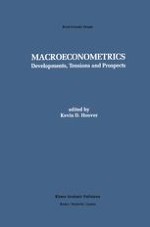1995 | OriginalPaper | Buchkapitel
The Lucas Critique in Practice
Theory Without Measurement
verfasst von : Neil R. Ericsson, John S. Irons
Erschienen in: Macroeconometrics
Verlag: Springer Netherlands
Enthalten in: Professional Book Archive
Aktivieren Sie unsere intelligente Suche, um passende Fachinhalte oder Patente zu finden.
Wählen Sie Textabschnitte aus um mit Künstlicher Intelligenz passenden Patente zu finden. powered by
Markieren Sie Textabschnitte, um KI-gestützt weitere passende Inhalte zu finden. powered by
Lucas (1976, p. 41) proposes an explanation for why coefficients in econometric equations might be nonconstant when policy rules change: “[G]iven that the structure of an econometric model consists of optimal decision rules of economic agents, and that optimal decision rules vary systematically with changes in the structure of series relevant to the decision maker, it follows that any change in policy will systematically alter the structure of econometric models.” Lucas’s critique of econometric models focuses on how parameters in policy rules may enter parametrically into economic agents’ optimization rules. Lucas (1976) considers examples where agents’expectationsof policy behavior enter into their optimization problem, and so parameters relating to policymakers’ rules appear in the agents’ first-order conditions. In essence, the issue is whether an econometric model isolates “invariants” of the economic process. Such invariance or autonomy is a topic with a lengthy and contentious history in the econometrics literature: see Haavelmo (1944) and Frisch (1948) for early discussions and Aldrich (1989) for an extensive historical perspective.
